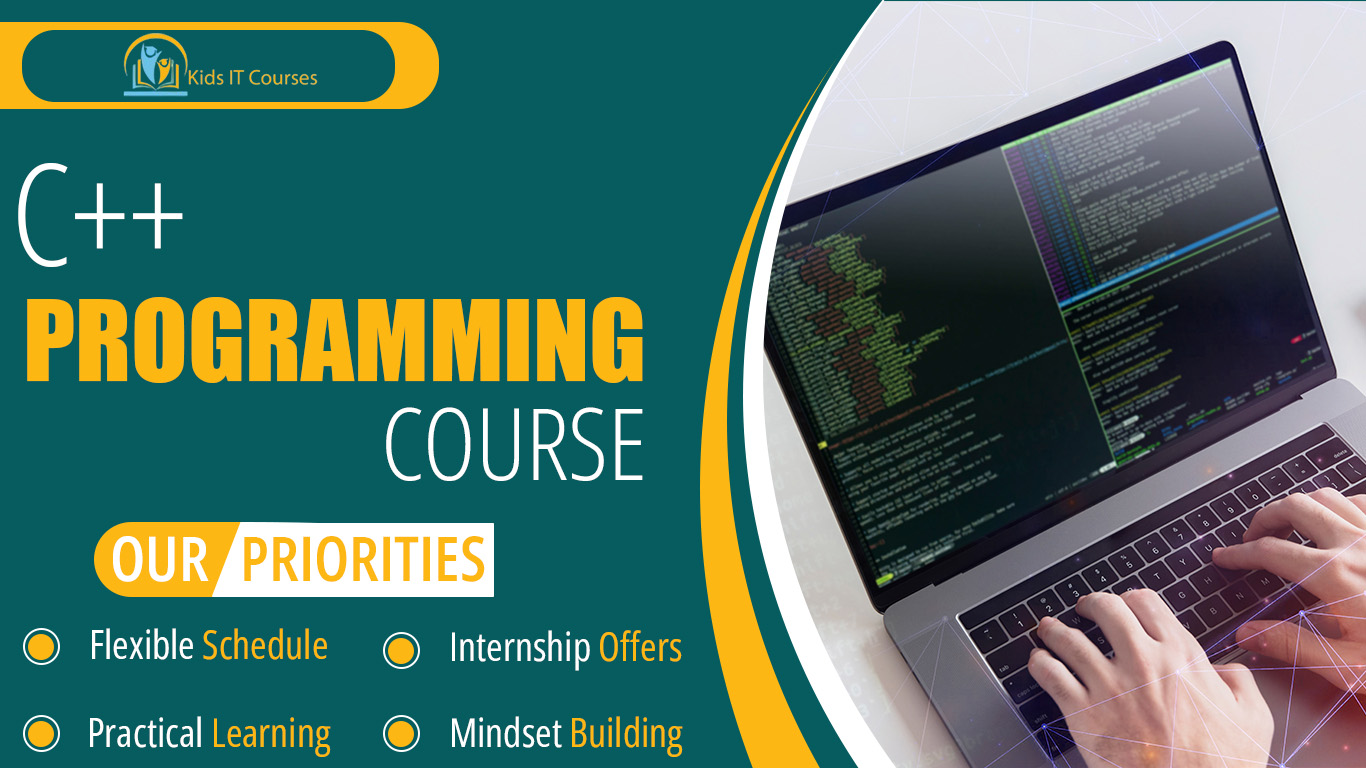
C++ Programming Course for Kids
- This interactive course introduces kids to C++ programming, a powerful language used to develop software, games, and systems.
- C++ is widely recognized for its efficiency and performance, making it a favorite among developers of operating systems and video games.
- Through exciting challenges and projects, kids will learn to write code, solve problems, and create their own programs using C++.
C++ programming | Kids Languages Skills nearby Rawalpindi
Definition
First of all, C++ is a high-level programming language used to create software applications, games, and systems.
It is an object-oriented language, meaning kids will learn how to organize and structure their code into reusable pieces called objects.
C++ allows kids to write efficient and fast programs that perform well, making it perfect for game development and simulations.
In this course, they’ll start by learning basic programming concepts like variables, loops, and functions.
Kids will also dive into more advanced topics like classes, objects, and inheritance to build more complex programs.
Through fun coding challenges, kids will practice solving problems by writing code that interacts with the computer and users.
Ultimately, this course will equip kids with the skills to create their own C++ projects, ranging from simple applications to games.
Importance
To start, learning C++ gives kids a strong foundation for understanding other programming languages, such as Java or Python.
C++ is known for its speed and efficiency, making it ideal for developing high-performance software and games.
By learning C++, kids develop critical thinking and problem-solving skills, as they learn to debug and fix issues in their code.
It also teaches them how computers work, as C++ provides more control over memory and processing power than many other languages.
As kids build programs in C++, they’ll improve their logical thinking and learn how to break down complex problems into smaller, manageable tasks.
Furthermore, C++ is widely used in industries like game development, embedded systems, and software engineering, providing future career opportunities.
Ultimately, mastering C++ helps kids develop technical skills that are highly valued in both academics and the tech industry.
Advantages for Freelancing Purpose
To begin with, kids can start by offering game development services, using C++ to create simple 2D or 3D games for clients.
They can also develop software applications for businesses or individuals, building custom solutions to meet specific needs.
As they gain experience, kids can specialize in creating high-performance applications for industries such as finance, gaming, or technology.
With their growing skills, kids can take on projects like developing interactive simulations or virtual environments for clients.
C++ is often used in embedded systems, so kids could work on projects like developing software for smart devices or IoT applications.
By building a portfolio of C++ projects, they can present their work on freelance platforms, attracting clients who need programming services.
Ultimately, learning C++ gives kids the tools to start a career in software development, offering endless opportunities to build and design tech solutions.
Session 1 : Introduction to Programming
- What is programming and why is it important?
- What can you build with C++?
- Difference between C++ and other languages (like Python or Scratch)
- Setting up a simple coding environment (online IDEs or Code::Blocks)
Session 2 : First C++ Program
- Writing your first “Hello World!” program
- Understanding what each line of code means
- How to run, debug, and fix simple errors
- Introduction to syntax rules
Session 3 : Variables and Data Types
- What are variables?
- Storing numbers, words, and true/false values
- Data types in C++ (int, float, char, bool, string)
- Creating fun programs using variables (like simple calculators)
Session 4 : User Input & Output
- Taking input from the user using cin
- Displaying results using cout
- Creating interactive mini-programs (like a name echo or mini quiz)
Session 5 : If Statements and Logic
- Making decisions in code
- if, else if, and else explained simply
- Relatable logic activities (like guessing games)
Session 6 : Loops – Repeating Like a Pro
- Introduction to while, for, and do while loops
- When and why we use loops
- Fun programs using loops (multiplication tables, countdowns)
Session 7 : –Functions – Breaking Down Code
- What are functions and why do we use them?
- Writing simple functions in C++
- Calling functions with and without parameters
- Mini calculator or number game using functions
Session 8 : Arrays & Basic Projects
- Storing multiple values with arrays
- Looping through arrays
- Final mini projects: number guessing game, calculator, or student grade tracker
Bonus Materials:
- Syntax cheat sheet
- Problem-solving practice worksheet
- Fun coding challenge pack
- Certificate of Completion
